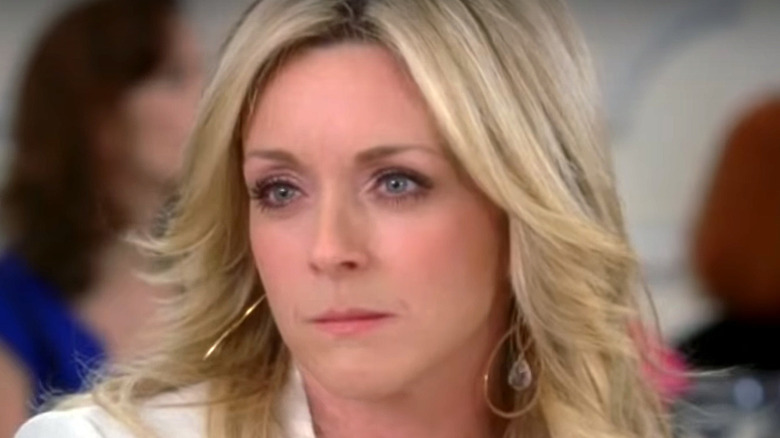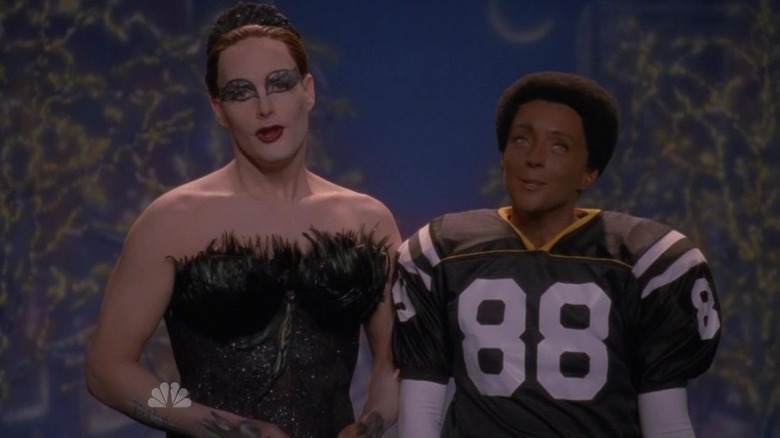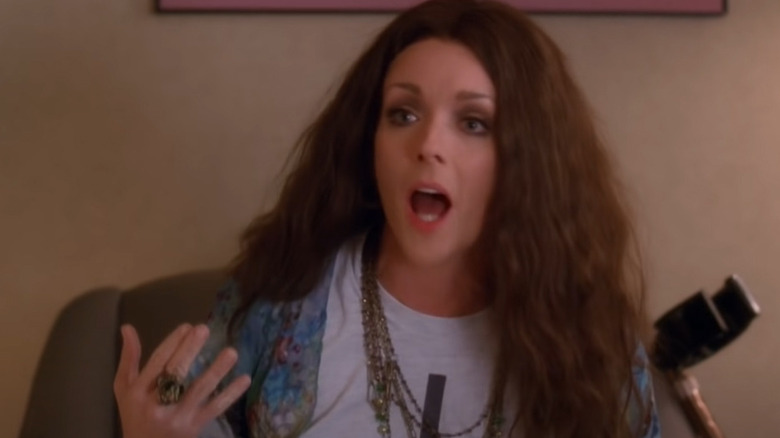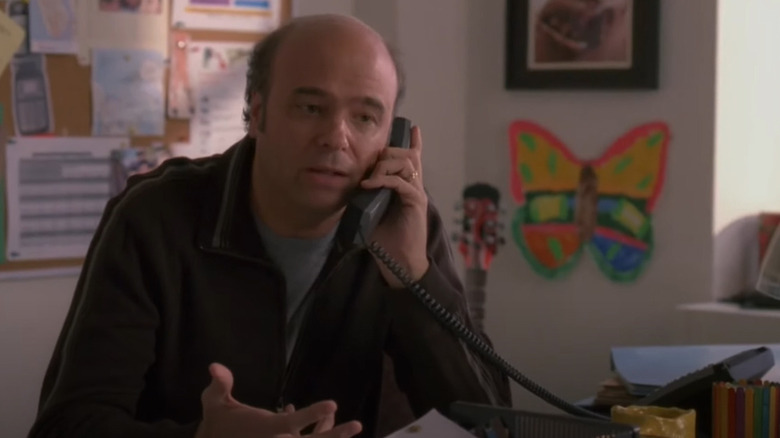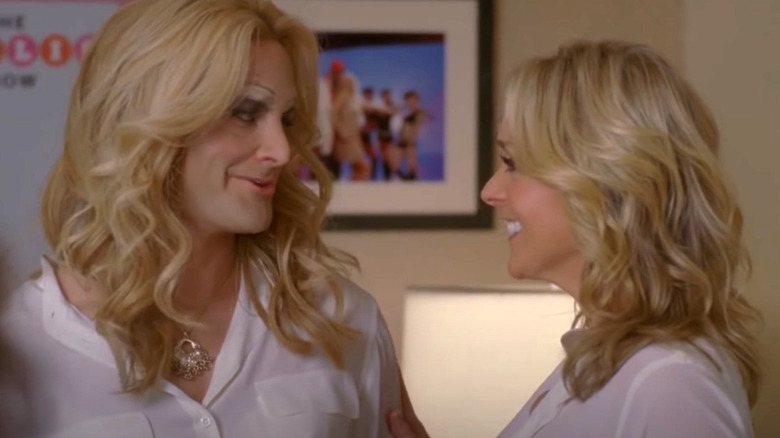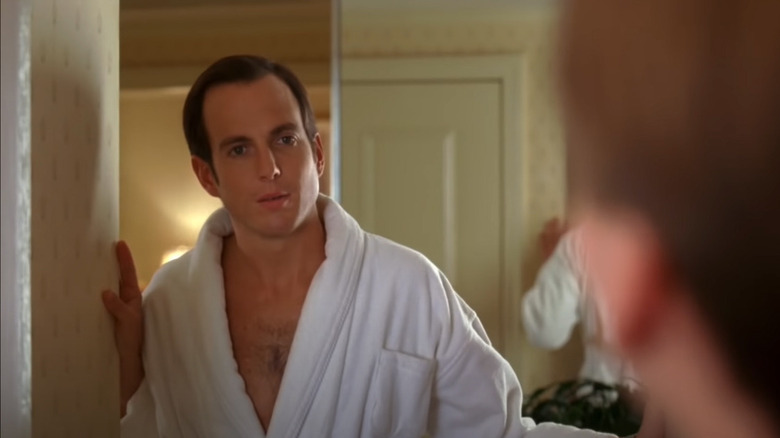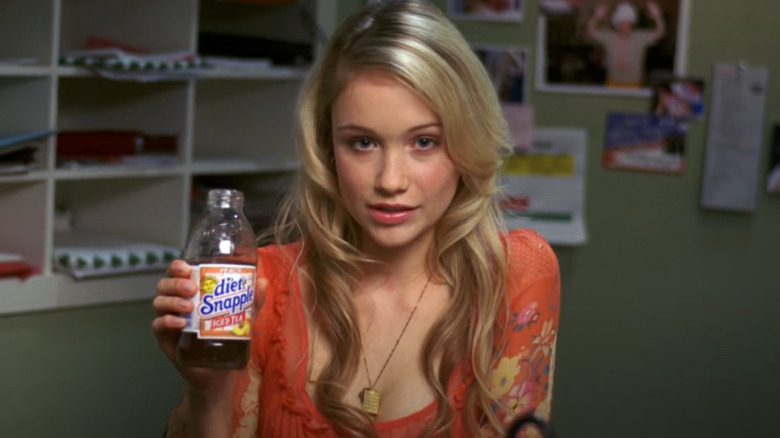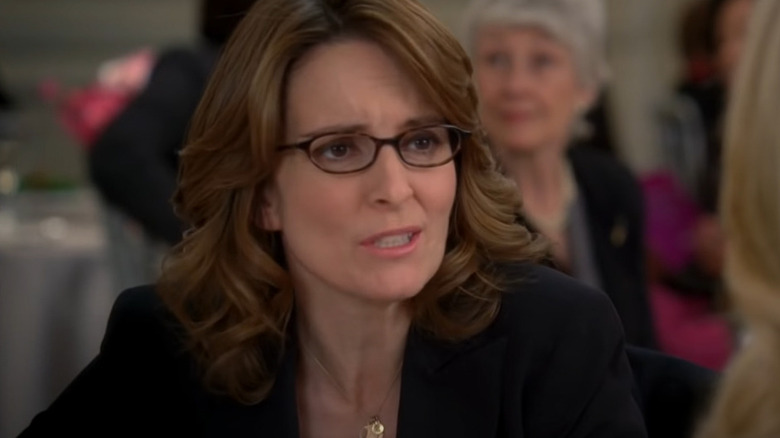Questionable Things That Happened On 30 Rock
Though it's been off the air for years, NBC's "30 Rock" is still widely considered to be one of the funniest sitcoms around. It also has its fair share of detractors, many of whom have re-evaluated the series in recent years as cultural conversations about race, sex, and other sensitive topics have expanded. While a handful of the popular show's episodes have been pulled from the air (we'll get to that later), there are plenty of others that contain questionable jokes, rely on offensive tropes, and perpetuate dangerous stereotypes.
It could be argued that some of the show's more eyebrow-raising moments have simply aged poorly. But a lot of them were criticized at the time they aired, making it clear that they were never actually acceptable. From the dumbing-down of Liz Lemon to the endless stream of homophobic jokes, these are the most questionable things that happened on "30 Rock."
Multiple occurrences of blackface
For some reason, "30 Rock" thought it would be a good idea to put white actors in blackface on multiple occasions. Tina Fey has called this "race-changing makeup," but that phrasing simply sidesteps the ugly history of minstrel shows and racial stereotypes in media.
In 2020, four episodes of "30 Rock" were pulled from streaming services because of their use of blackface. According to Newsweek, this includes a Season 3 episode where Jenna (Jane Krakowski) dresses as a Black man after exchanging identities with Tracy, a Season 5 episode where Jenna (again) dresses up like Black football player Lynn Swann for a "Black Swan" party, a Season 6 episode where Jon Hamm uses blackface to parody a 1950s sitcom, and a Season 5 episode which features Hamm as a doctor who gains a Black man's hands after losing his own.
Despite circumventing the word "blackface," Fey expressed support for removing the episodes. "I understand now that 'intent' is not a free pass for white people to use these images," she wrote in a statement (via BBC). "I apologize for pain they have caused. Going forward, no comedy-loving kid needs to stumble on these tropes and be stung by their ugliness." In addition to being pulled from streaming and online stores like iTunes, the episodes no longer air as reruns.
Storylines dropped with no explanation
There are a lot of strong storylines on "30 Rock," but for every one that hits the mark, another seems to fall by the wayside. The show tends to start stories, then drop them with little or no explanation. This happens with virtually every character at some point, but particularly with supporting ones like Tracy (Tracy Morgan), Jenna, and Kenneth (Jack McBrayer). One example is Jenna's relationship with her mother Verna (Jan Hooks), which is explored briefly in Season 4 when Jack bribes Verna into being a good mother, then is never referenced again. Another example is when Jenna is set to star in a low-budget Janis Joplin biopic called "Jackie Jormp-Jomp," which is completely dropped by the end of Season 3.
Even the lead characters see some of their plot lines die without explanation, like when Liz (Tina Fey) is supposed to start a talk show called "Dealbreakers," or when she engages in an adoption process that never leads to a baby. The Atlantic even commented upon the latter arc in 2009: "Liz's desire to have a child led her to go through a rigorous and hilarious adoption screening process in the third-season premiere — a plot line that largely evaporated from the rest of the season."
Employing racial stereotypes for women of color
Despite having no women of color in its main cast, "30 Rock" contains plenty of stereotypes regarding them. Salma Hayek played Jack's mother's nurse (and his eventual girlfriend) Elisa Pedrera in seven episodes of the show. Elisa, who is Puerto Rican, gets slapped with a ton of tired jokes. First of all, Liz constantly screams "Puerto Rican!" when she sees Elisa. Elisa is also presented as a "fiery Latina" who murders her husbands and cannot control her jealousy when she thinks Jack is cheating with Liz. Even her language skills are mocked, as when Jack says, "Elisa and I have enough obstacles. Our work schedules, our cultures, her adorably broken English."
The show doesn't do much better with Angie Jordan (Sherri Shepherd), Tracy's hilarious but deeply cliched wife. Angie appears in 11 episodes, and is consistently portrayed as loud, angry, and sassy. This is an incredibly persistent stereotype facing Black women in media, sometimes referred to as the "Sapphire caricature." Such portrayals have been found to have real-life effects on Black women's lives. Perhaps these racist caricatures would have stood out less if there were more women of color on "30 Rock." But there aren't, so they stick out like sore thumbs.
Making light of rape and child abuse
Good humor often pushes the line of what is acceptable, but there are some jokes on "30 Rock" that take things too far — at least for primetime, anyway. The show's jokes about rape and child abuse, for example, are so numerous, they become hard to stomach. In one Season 5 episode, resident pervert Pete Hornberger (Scott Adsit) jokes, "This morning, I made love to my wife. And she was still asleep, so I didn't have to be gentle." In the same episode, Jack makes light of a theme park appealing to pedophiles, and Liz's boyfriend Carol (Matt Damon) cracks a joke about being abused by a priest. Again, this is all in one episode.
Other episodes have a similarly heavy focus on rape and abuse. Liz's on-and-off boyfriend Dennis Duffy (Dean Winters) is featured on "To Catch a Predator." There are multiple jokes about Harvey Weinstein and Bill Cosby. Cruel, sexist terms aimed at women are in constant use. Oh, and Susan Sarandon plays a high school teacher who groomed Frank (Judah Friedlander) when he was her student. Taken together, the ceaseless use of such jokes on "30 Rock" ends up making light of intensely serious issues.
Casual transphobia
In December 2020, author and columnist Juno Dawson tweeted, "'30 Rock' is a lot more transphobic than I remember." In hindsight, it's a lot more transphobic than we remembered as well. The show uses plenty of slurs for transgender individuals, and often reduces them to caricatures for the sake of humor. Moreover, the word "transgender" is frequently used as a noun: Jack calls a colleague "a post-op transgender," while trans character Jeffrey Weinerslav describes himself as "an overweight transgender."
Jenna's partner Paul L'Astnamé (Will Forte) is another example of "30 Rock" mishandling its portrayal of gender identity and the trans community. The character, who appears in 11 episodes, dresses up like Jenna, and is frequently the butt of the joke. As The Guardian's Andrew Sweet wrote, "It should be noted there are some bits of the show that have aged less like fine wine and more like poorly refrigerated meat." These jokes are nothing but stale bologna.
Using gay male characters as punchlines
Over and over again, "30 Rock" treats gay male characters like jokes. Take Jack's nemesis, Devon Banks (Will Arnett), who is portrayed as a gay sexual predator. This trope has been used to demonize gay men in media for decades. Liz's cousin Randy (Jeffery Self) is another example of utterly bottom-of-the-barrel stereotyping — he exists mostly to give Liz a makeover.
In addition to stock gay characters, there are also many jokes made at the expense of gay men. In one episode, Jack presents the idea of a "gay bomb" to the Pentagon, which would turn people gay when used in enclosed areas, thus ensuring "gay panic." In another episode, Avery accuses Jack of drinking "gay juice" when he gets emotional. And then there's "Gay Sports Center," which further stereotypes gay men and reduces them to a punchline. "30 Rock" never fails to make gay men into tired jokes, flat characters, and worn-out symbols.
Endless jokes about lesbians
Any time that Liz is seen as being less-than-feminine, "30 Rock" makes an exhausting joke about lesbians. In one episode, Jack question's Liz's sexuality because of her choice of footwear. In another scene, Frank, by way of a computer voice, says, "Lemon, Lesbian Frankenstein wants her shoes back." There are lesbian jokes in relation to everything from Liz's alleged frumpiness to short haircuts. Furthermore, the word "lesbian" is frequently inserted in front of other things — "Lesbian Mario Brothers," "Lesbian Yellow Sour Fruit," "Lesbian Clown Shirts" — to garner cheap laughs.
For what it's worth, "30 Rock" received a GLAAD Media Award in 2011 (via Today). But the fact remains that what was acceptable more than a decade ago isn't okay today, and the show's lesbian jokes fall into a category GLAAD calls "punching down." As GLAAD notes, "Jokes at the expense of the LGBTQ community, which are often labeled reductively as 'gay jokes,' can be funny. But they are often discriminatory and destructive, serving as a reproduction of oppressive social norms that have haunted the LGBTQ community for generations." That definitely sums of the endless parade of lesbian jokes on "30 Rock."
Disappearing characters
Though this is less problematic than stereotypes and caricatures, another questionable thing "30 Rock" became known for is having characters who simply vanish. Multiple Reddit threads have been devoted to these missing characters, such as this one on Danny Baker (Cheyenne Jackson), a robot street performer who has a short fling with Liz before disappearing. Even some characters who remain on the show for its whole run are affected by this tendency: Cerie, Grizz, and Dot Com see their screen time shrink as the seasons wear on, as The Atlantic pointed out.
By far, the most discussed missing character on "30 Rock" is Josh Girard (Lonny Ross), who's originally one of the main actors on "TGS." His role steadily diminishes until it evaporates entirely in Season 4. After 37 episodes, there is no real fanfare to his departure — probably because we barely see him after Season 1. Still, it's an oddly sudden ending. Another example is Jack's devoted assistant Jonathan, who disappears in Season 6. This is due to actor Maulik Pancholy leaving to co-star on the short-lived NBC sitcom "Whitney" (via CBR), but the fact that he vanishes, then abruptly returns in Season 7 with little acknowledgment, is still strange.
Making light of Tracy Morgan's homophobia
In June 2011, Tracy Morgan went on a virulent anti-gay rant at a Nashville show. According to first-hand accounts (via The Hollywood Reporter), Morgan expressed a belief that kids become gay through media influence, and that being gay is a choice. He also said that if his son were gay, he would "pull out a knife and stab" him.
There is nothing humorous about these comments, and Morgan recieved very justified outrage from LGBTQ organizations. Morgan issued a half-hearted apology for his "choice of words," but not the sentiments expressed (via The Hollywood Reporter). Then, a few months later, Morgan walked back his apology even further in an appearance on "The Late Show with David Letterman," claiming people were "bummed out" due to a "misunderstanding."
For some reason, "30 Rock" writers thought it would be a good idea to make light of the whole incident in Season 6's "Idiots are People Two!" Tracy is told by Liz that he must apologize for homophobic remarks he made on stage. While Tracy originally does not want to apologize, he eventually does ... to Glad garbage bags and not GLAAD, the LGBTQ organization. Why throw salt in a wound that was never properly healed?
Pretending Liz is unattractive
"30 Rock" makes many, many jokes about Liz Lemon being unattractive. There are a couple of questionable elements here. First, if Liz is effective in her job, why do we care what she looks like? And if we are going to grade people by appearance, why isn't there more conversation about her male colleagues?
The other issue is the fact that Tina Fey is a traditionally attractive woman. In a thought-provoking article on Feministing, writer Chloe Angyal compares Liz Lemon to Rachel Berry (Lea Michele) on "Glee." "Liz Lemon, like Rachel, is a flawed character," Angyal notes, "but the constant references to her ugliness are just absurd. And while beauty is of course subjective, these two women absolutely meet our culture's standard of female beauty."
At some point, this tendency becomes so pronounced that "30 Rock" has to invent increasingly absurd reasons for people to be repulsed by Liz. The show gives her questionable hygiene, dorky interests, and an unhealthy relationship with junk food. She's also portrayed as being very unlucky in love. The implication ends up being that a woman cannot be both smart and attractive, despite the obvious fact of Fey's beauty staring viewers in the face. Liz is the only main female character who is deemed to be intelligent, and so she is also the only one characterized as unfeminine and undesirable.
Portraying most female characters as stupid
In contrast to the competent but "unattractive" Liz Lemon, other women on "30 Rock" are treated as idiots. If there were more female characters, perhaps this would be less of an issue, but given the imbalance of men to women on "30 Rock," these characters stand out like a sore thumb.
Aside from Fey, Jane Krakowski (Jenna) and Katrina Bowden (Cerie) are the only women to make it into the opening credits. Both Jenna and Cerie are blonde and pretty, both coast on their looks, and both are portrayed as being incredibly dumb. Cerie has little ambition, and is essentially positioned as the anti-Liz: She once tells Liz, "I'm just gonna marry rich and then design handbags." Jenna, on the other hand, is highly motivated, but also not very smart. She studied "game show pointing and theatre superstitions" in school, is willing to go on a diet where she eats paper, and confuses Barack Obama and Osama Bin Laden on a talk show. Jane Krakowski is a phenomenal actress who plays dumb so well, it's easy to be blinded to the larger implications of her character. But when you take a step back, it's impossible not to notice the frustrating trend Jenna is part of.
Cerie's constant objectification
In addition to making Cerie unmotivated and unintelligent, the "30 Rock" team also makes sure that her appearance is consistently commented upon. Cerie often seems to exist for the sole purpose of being ogled and objectified — or as a means of pointing out Liz's relative lack of sex appeal. The character famously doesn't wear bras, telling Liz that "they kinda just stay up on their own," and is eventually told to dress differently to avoid distracting the men in the office. That's far too close to the dangerous line of thinking that blames women's attire for men's actions, which is often used to justify sexual assault.
Pete is probably the worst offender when it comes to objectifying Cerie. When Cerie announces her engagement to the crew, Pete asks, "Hey, this isn't going to change the way you dress or eat lollipops, is it?" It's worth noting that not only does Pete work in a superior position as a producer, he's also roughly twice Cerie's age. Even Esquire refers to Cerie as "the jail-bait intern who does little work beyond distracting the dudes in the writers' room ... and keeping Liz Lemon's ego in check." Ugh.
Dumbing down Liz Lemon
At the start of "30 Rock," Liz Lemon is flawed, but undoubtedly an intelligent and capable woman who has achieved a notable level of success. At her best, Liz is the foundation of the show's most flawless episodes. As the seasons progress, however, Liz becomes less smart, less independent, and less adept. In the end, she's more like Jack's childish underling than his competent mentee.
Liz's dumbing-down is so noticeable that it became a news story: Slate ran an article in 2012 that compares Liz to Homer Simpsons at his most idiotic. NPR also published a piece that same year about Liz's "shrinking" abilities. While Liz begins as a "likable, smart, profoundly flawed woman trying her hardest to navigate all manner of show-business nuttiness," the piece opines, she ends up "robbed of everything that made her relatable." NPR also takes aim at Liz's overall infantilization, nothing that by Season 6, she constantly seeks Jack's approval and defers to him on all decisions, even those related to her personal life. Liz Lemon has some truly remarkable moments, but they become harder and harder to find as the series goes on.
